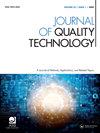Introduction to High-Dimensional Statistics, Christophe Giraud. Chapman\& Hall/CRC Press, 2021, 364 pp., $72.00 hardcover, ISBN 978-0-367-71622-6.
IF 2.2
2区 工程技术
Q2 ENGINEERING, INDUSTRIAL
引用次数: 0
Abstract
A deep dive into the theoretical underpinnings of common high-dimensional statistical 20 techniques, Dr. Giraud’s Introduction to High-Dimensional Statistics is a good reference for those who wish to explore the mathematical foundations of state-of-the-art multivariate methods. The book covers a wide array of topics, from estimation bounds to multivariate regression and even clustering. In this 2nd edition, Dr. Giraud expands his work to include more recent advances and statistical methods. The book consists of 12 chapters, starting with a brief introduction to the complexities of conducting statistics in high dimensions. The book then proceeds similar to a standard statistical textbook, moving from properties of statistical estimators to statistical modeling, including regression and then other more advanced topics. Each chapter concludes with a set of exercises, many of which are portions of proofs from the chapter left for the reader. All that being said, do not let the title of the book fool you. By the author’s own admission, this is not an introduction on the same level as Hastie et al.’s Elements of Statistical Learning. Instead, the focus of this book is on the mathematical foundations of high-dimensional techniques, proving theorems regarding properties of estimators. I must confess this is not quite what I expected upon first look; one truly cannot judge a book by its cover. That is not to say that this book is lacking. It is impressive in its efficient, yet thorough, presentation of the theory. I especially appreciated how the author took time at the beginning to illustrate some of the strange behavior one encounters in very high dimensions. However, I did find it jarring that mathematical notation was very often used without much introduction. There is an appendix with notations at the end of the book, but I would’ve rather had a bit more interpretation within the text rather than having to flip back and forth. There were also a few typographical errors and partial omissions of formulas, though I can’t be sure if this was part of the text or bugs in the software I used to read the digital version. In summary, this book would certainly make for a good graduate level textbook in an advanced course on statistical methods. If you are willing to put the necessary time and investment into rigorously exploring the foundations of high-dimensional statistics, than you can hardly do better than this book.《高维统计导论》,Christophe Giraud著。查普曼和霍尔/CRC出版社,2021,364页,72.00美元精装,ISBN 978-0-367-71622-6。
深入研究了常见的高维统计技术的理论基础,Giraud博士的《高维统计导论》对于那些希望探索最先进的多元方法的数学基础的人来说是一个很好的参考。这本书涵盖了广泛的主题,从估计边界到多元回归甚至聚类。在这第二版中,吉罗博士扩展了他的工作,包括更多的最新进展和统计方法。本书由12章组成,首先简要介绍了在高维中进行统计的复杂性。然后,本书与标准统计教科书类似,从统计估计器的属性转移到统计建模,包括回归和其他更高级的主题。每章以一组练习结束,其中许多是本章为读者留下的证明部分。话虽如此,不要被书名骗了。根据作者自己的承认,这不是与Hastie等人的统计学习要素相同水平的介绍。相反,本书的重点是高维技术的数学基础,证明了关于估计器性质的定理。我得承认,这和我第一眼看到的不太一样;不能以貌取人。这并不是说这本书有缺陷。它对这一理论的阐述既有效又透彻,令人印象深刻。我特别欣赏作者如何在开始时花时间来说明人们在非常高的维度上遇到的一些奇怪的行为。然而,我确实发现数学符号在没有太多介绍的情况下经常被使用是不和谐的。在书的末尾有一个附录和注释,但我宁愿在文本中有更多的解释,而不是来回翻阅。还有一些排版错误和公式的部分遗漏,尽管我不能确定这是文本的一部分还是我用来阅读数字版本的软件的错误。总之,这本书肯定会成为一个很好的研究生水平的教科书在统计方法的高级课程。如果你愿意投入必要的时间和投资来严格探索高维统计的基础,那么你很难比这本书做得更好。
本文章由计算机程序翻译,如有差异,请以英文原文为准。
求助全文
约1分钟内获得全文
求助全文
来源期刊

Journal of Quality Technology
管理科学-工程:工业
CiteScore
5.20
自引率
4.00%
发文量
23
审稿时长
>12 weeks
期刊介绍:
The objective of Journal of Quality Technology is to contribute to the technical advancement of the field of quality technology by publishing papers that emphasize the practical applicability of new techniques, instructive examples of the operation of existing techniques and results of historical researches. Expository, review, and tutorial papers are also acceptable if they are written in a style suitable for practicing engineers.
Sample our Mathematics & Statistics journals, sign in here to start your FREE access for 14 days
 求助内容:
求助内容: 应助结果提醒方式:
应助结果提醒方式:


